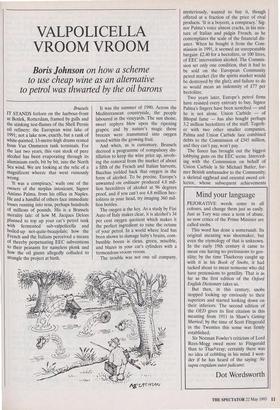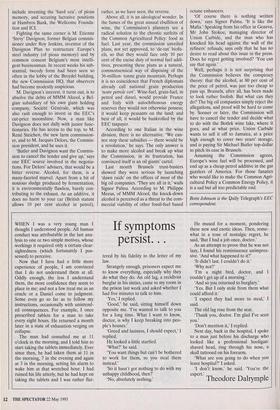VALPOLICELLA VROOM VROOM
Boris Johnson on how a scheme
to use cheap wine as an alternative to petrol was thwarted by the oil barons
Brussels IT STANDS forlorn on the harbour-front at Botlek, Rotterdam, framed by gulls and the stinking test-flames of the Shell Pernis oil refinery: the European wine lake of 1991; not a lake now, exactly, but a rank of white-painted, 13-metre-high drums rented from Van Ommeren tank terminals. For the last two years, this vast stock of pure alcohol has been evaporating through its aluminium roofs, bit by bit, into the North Sea wind. We are looking at the relic of a magnificent wheeze that went ruinously wrong.
`It was a conspiracy,' wails one of the owners of the surplus intoxicant, Signor Antimo Palma, from his office in Naples. He and a handful of others face immediate losses running into tens, perhaps hundreds of millions of pounds. His is a Brussels morality tale: of how M. Jacques Delors planned to top up your car's petrol tank with fermented sub-valpolicella and boiled-up not-quite-beaujolais; how the French and the Italians perceived a means of thereby perpetuating EEC subventions to their peasants for nameless plonk and how the oil giants allegedly colluded to strangle the project at birth. It was the summer of 1990. Across the Mediterranean countryside, the people laboured in the vineyards. The sun shone, sweet zephyrs blew upon the ripening grapes; and by nature's magic those breezes were transmuted into oxygen stored within the growing fruit.
And when, as is customary, Brussels decreed a programme of compulsory dis- tillation to keep the wine price up, involv- ing the removal from the market of about a fifth of the French and Italian harvests, Bacchus yielded back that oxygen in the form of alcohol. To be precise, Europe's unwanted yin ordinaire produced 4.8 mil- lion hectolitres of alcohol at 96 degrees proof, and if you can't see 4.8 million hec- tolitres in your head, try imaging 360 mil- lion bottles.
The oxygen is the key. As a study by Fiat Auto of Italy makes clear, it is alcohol's 34 per cent oxygen quotient which makes it the perfect ingredient to raise the octane of your petrol. In a world where lead has been shown to damage baby's brains, com- bustible booze is clean, green, miscible, and blazes in your car's cylinders with a tremendous vroom vroom.
The trouble was not one oil company, mysteriously, wanted to buy it, though offered at a fraction of the price of rival products. 'It is a boycott, a conspiracy.' Sig- nor Palma's voice almost cracks, in his mix- ture of Italian and pidgin French, as he contemplates the scale of the financial dis- aster. When he bought it from the Com- mission in 1991, it seemed an unrepeatable bargain: £2.40 for a hectolitre, or 100 litres, of EEC intervention alcohol. The Commis- sion set only one condition, that it had to be sold on the European Community petrol market (for the spirits market would be destroyed by the glut); and failure to do so would mean an indemnity of £77 per hectolitre.
Two years later, Europe's petrol firms have resisted every entreaty to buy. Signor Palma's fingers have been scorched — and he is not alone. Union Carbide — of Bhopal fame — has also bought perhaps 3.2 million hectolitres of the stuff. Togeth- er with two other smaller companies, Palma and Union Carbide face combined debts to the Commission of £345 million, and they can't pay, won't pay.
The fiasco has brought out the biggest lobbying guns on the EEC scene. Interced- ing with the Commission on behalf of Union Carbide is Sir Michael Butler, for- mer British ambassador to the Community, a skeletal egghead and oriental sword col- ector, whose subsequent achievements include inventing the 'hard ecu', of pious memory, and securing lucrative positions at Hambros Bank, the Wellcome Founda- tion and ICI.
Fighting the same corner is M. Etienne `Stevy' Davignon, former Belgian commis- sioner under Roy Jenkins, inventor of the Davignon Plan to restructure Europe's steel industry (of pious memory) and by common consent Belgium's most intelli- gent businessman. In recent weeks his sub- stantial, tweedy form had been seen so often in the lobby of the Breydel building, the new Commission HQ, that observers had become modestly suspicious.
M. Davignon's interest, it turns out, is to absolve the debts of MMM Alcool, a Bel- gian subsidiary of his own giant holding company, Societe Generale, which was also rash enough to invest in the EEC's cut-price moonshine. Now, a man like Davignon does not daily with junior func- tionaries. He has access to the top, to M. Rene Steichen, the new farm commission- er, and to M. Jacques Delors, the Commis- sion president, and he uses it.
`Butler and Davignon want the Commis- sion to cancel the tender and give up,' says one EEC source involved in the negotia- tions. For Delors' advisers, that would be a bitter reverse. Alcohol, for them, is a many-faceted marvel. Apart from a bit of noxious sludge produced by fermentation, it is environmentally flawless, barely con- tributing to the exhaust. As an additive, it does no harm to your car (British statute allows 10 per cent alcohol in petrol), rather, as we have seen, the reverse.
Above all, it is an ideological wonder. In the fumes of the great annual ebullition of wine, the Commission's planners see a radical solution to the chronic surfeits of the Common Agricultural Policy: food as fuel. Last year, the commission unveiled plans, not yet approved, to `de-tax' biofu- els, so that they would face only 10 per cent of the excise duty of normal fuel addi- tives, presenting these plans as a natural, commonsensical way of disposing of the 36-million- tonne grain mountain. Perhaps it is no coincidence that French diplomats already call national grain production noire petrole vent'. Wine-fuel, grain-fuel, in petrol and diesel, would provide France and Italy with autochthonous energy reserves they would not otherwise possess; it would keep peasants on the land; and best of all, it would be bankrolled by the EEC taxpayer.
According to one Italian in the wine division, there is no alternative. 'We can- not stop these subsidies — there would be a revolution,' he says. The only answer is to make more alcohol and break up what the Commission, in its frustration, has convinced itself is an oil giants' cartel.
Last month Brussels trust-busters showed they were serious by launching `dawn raids' on the offices of most of the big oil companies. 'They are all in it,' wails Signor Palma. According to M. Philippe Meeus, of MMM Alcool, the knock-down alcohol is perceived as a threat to the com- mercial viability of other fossil-fuel based octane enhancers.
`Of course there is nothing written down,' says Signor Palma. 'It is like the Mafia.' Speaking from his office in Geneva, Mr John Stokoe, managing director of Union Carbide, and the man who has knocked his head against the wall of the refiners' refusals, says only that he has no desire to read about this issue in the press. Does he regret getting involved? 'You can say that again.'
Well, perhaps it is not surprising that the Commission believes the conspiracy theory: that the alcohol, at 80 per cent of the price of petrol, was just too cheap to pass up. Brussels, after all, has been made to look rather foolish. But what can they do? The big oil companies simply reject the allegations, and proof will be hard to come by. Sooner or later, the Commission will have to cancel the tender and decide what to do with the Botlek wine lake, where it goes, and at what price. Union Carbide wants to sell it off to Jamaica, at a price high enough to cover two years' storage, and is paying Sir Michael Butler top-dollar to pitch its case in Brussels.
Assuming the Commission agrees, Europe's wine fuel will be processed, and end up as a cheap petrol additive in the gas guzzlers of America. For those fanatics who would like to make the Common Agri- cultural Policy a Common Energy Policy, it is a sad but all too predictable end.
Boris Johnson is the pally Telegraph's EEC correspondent.



















































 Previous page
Previous page